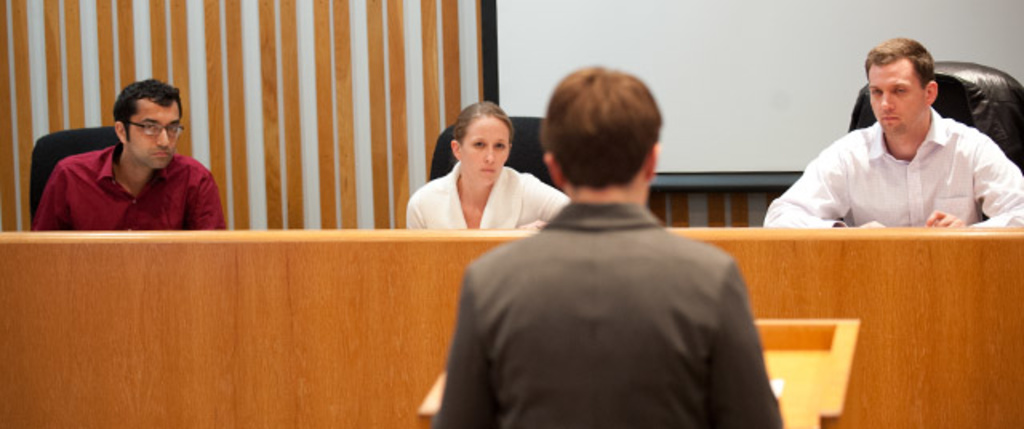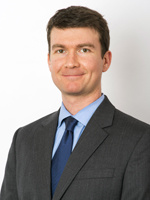Intellectual property (IP) law is one of the hot growth areas in legal employment, and recent moot court competition victories show the University of Iowa College of Law is becoming an IP attorney machine.
As evidence, the law school’s three IP law moot court teams have won top honors in three prestigious regional and national competitions this spring. Christina Bohannan, professor of law and faculty advisor/coach of the moot court teams, says their success and growing national reputation show UI’s IP law graduates are ready to help the growing practice area.
“These competitions show the students how develop their skills and showcase those skills to show prospective employers,” she says. “When our students do well in regional and national competitions, it shows that they can do the research, the writing, the analysis, and the oral advocacy that lawyers must do in real law practice, and they can do all of those things as well or better than anyone in the country.”
Intellectual property law gives ownership to the creator of an intangible asset, such as a book, movie, piece of music, or technology. IP was little known to the public for years, so much so that when NBC cited IP to keep David Letterman from using many of his bits and characters on his CBS show, people thought the network was making it up. But when Letterman’s show debuted on CBS, Viewer Mail had become the Mailbag, and Larry “Bud” Melman was now called Calvert DeForest.
But the field has exploded into the public consciousness since then, with the growth of technology and the Internet creating more and more innovation at every turn, and the legal profession, lawmakers and justice system struggling to keep up with advances in technology and innovation that far outpace IP laws passed decades ago. Innovations in fields like biotechnology, pharmaceuticals, computer hardware and software, and other areas of technology are created everyday and lead to a need for more attorneys to protect the intellectual property of their inventors. Social media also brings the field into peoples’ everyday lives, now that bloggers can get cease and desist letters from putting works of art on a blog without permission, and just try to find a Prince video on YouTube.
IP law is why Apple is suing Samsung, claiming the unique look and feel of Apple's iPhone and iPad had been incorporated illegally into Samsung’s Galaxy products; and why Monsanto doesn’t let farmers save its genetically modified seeds.

The law school had no IP moot court teams at all just four years ago, when a group of students found out about one and asked Bohannan to help them prepare for it. Students can now participate in one of three areas—copyrights, trademark and patents—and all three have quickly established themselves as among the nation’s best, placing high at three of the top tournaments and beating heavyweights like Georgetown, George Washington, Northwestern, and California.
The trademark team of Alex Johnson, Ravi Narayan, and Sam Young won the regional competition in Chicago, placed second of 87 teams at the national Saul Lefkowitz competition in Washington, D.C., in March, and won the Best Brief award. Iowa’s other trademark team of Abram Carls, Justin Kelemkiarian, Trong Le, and Iftehar Zaim, won third place at the regional competition.
The law school’s two copyright teams both finished in the top eight in the Cardozo/BMI National Copyright Law competition in New York in March. Amanda Fray and Jake Thompson finished in the top four, while Dan Garon and Allyson Weaver finished in the top eight. Garon was also named among the top 10oralists for the competition.
The patent team of Laura Hupp and Estiven Rojo won the Midwest Regional of the Giles Sutherland Rich patent law moot court competition in Chicago in March and competed in the national tournament last week in Washington, DC. Hupp and Rojo also won the award for Best Brief at the regional competition. The other UI team at the regional competition, comprised of Sharad Bijanki and Samantha Rollins, won the award for Best Oral Argument.
Like most moot court competitions, teams are given a set of facts in a hypothetical lawsuit and then asked to argue for one of the hypothetical parties—and then the other—before a panel of judges, in this case, IP law practicing attorneys and judges. They also write legal briefs supporting their positions.
Students on the teams credit Bohannan for preparing them to rise so quickly.
“She’s committed to moving this forward, she’s encouraging, she puts the right people on the right team, and she asks tough questions so we’re ready to expect tough questions from the judges,” says Hupp, a second year student from Scranton, Iowa, who returned to her home state from Texas specifically because of the law school’s strong IP law program.

Young, a third year student on the trademark team, says Bohannan has a wide network of alumni and IP practitioners who serve as judges at their practices.
“They ask us tough questions about our positions and our thinking and they give us pointers, so we’re prepared for the judges’ aggressive questions at the competitions,” he says.
Both say the experience will help them in their careers. Young graduates this spring and will work as a corporate attorney at Fredrikson & Byron in Minneapolis. Hupp, a second year student, will work this summer as a summer associate at McKee Voorhees and Sease, a Des Moines firm that specializes in IP law. She also works during the school year doing IP work for the UI Research Foundation.
“It’s always new and interesting and it changes with every new invention,” she says. “I’m learning not just about the law, but about new technologies and cool things that researchers come up with.”